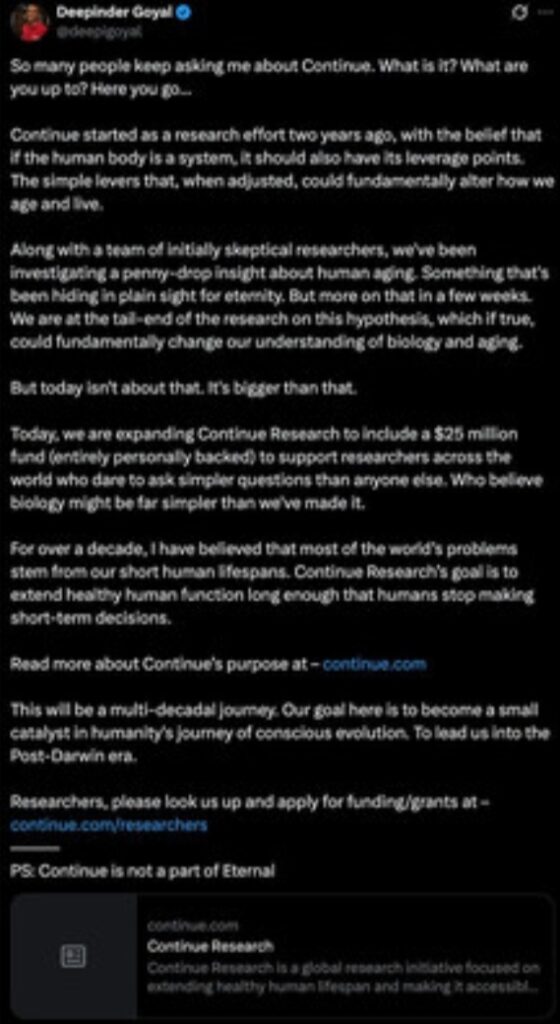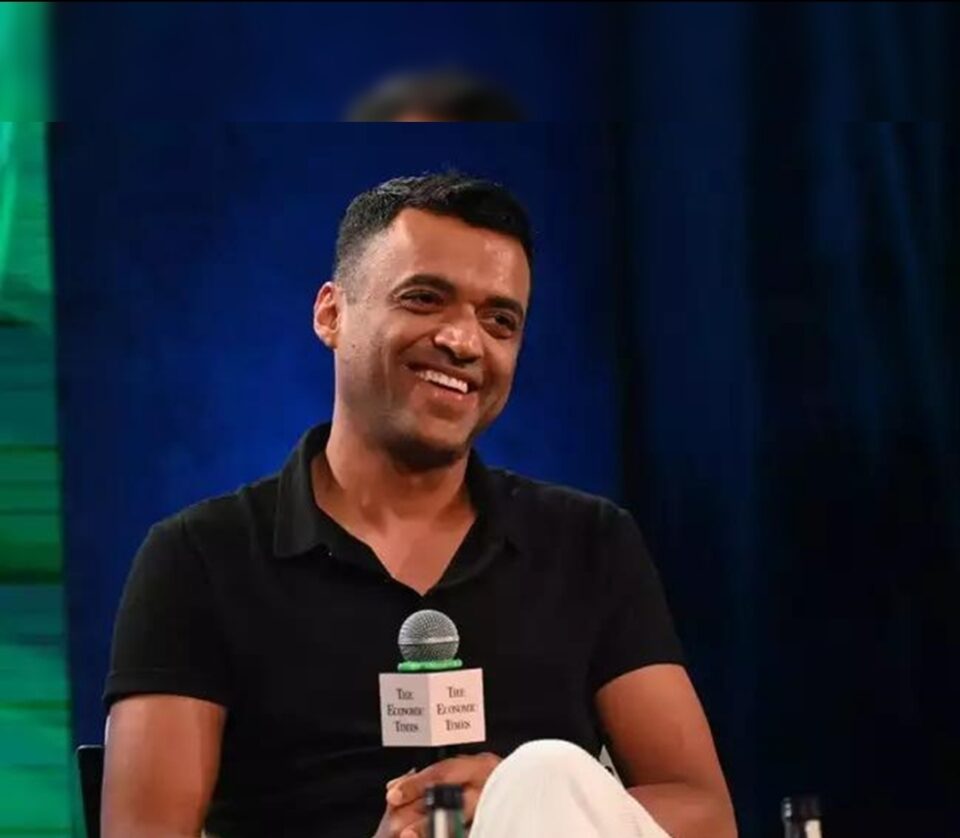Reimagining Human Longevity: How Deepinder Goyal’s ‘Continue Research’ Brings Purpose, Science, and Open Collaboration to the Forefront of Innovation about Longevity Science
It’s not every day that the leader of India’s most valuable tech enterprise decides to look beyond markets and metrics—to question life itself. Yet that’s exactly what Deepinder Goyal, Founder and CEO of Eternal (formerly Zomato), has done with his newly expanded project—Continue Research.
Announced on October 25, 2025, Continue Research marks a bold step into the future of human longevity science, backed by a $25 million personal fund. But beyond its scientific intent, this initiative holds lessons for CX and EX leaders across industries—about culture, curiosity, and the courage to reimagine the human experience.
The Challenge: Short-Term Culture in a Long-Term World
Walk into any boardroom today, and you’ll feel the tension between urgency and meaning. Quarterly targets dominate decisions; innovation often bends to immediate ROI. The result? Organizations—and humans—act like they’re running out of time.
Ironically, the real opportunity lies in extending it.
This is where Deepinder Goyal’s perspective strikes a cultural chord. “We need to extend healthy human function long enough that humans stop making short-term decisions,” he wrote in a note summarizing the mission of Continue Research. That insight doesn’t just fuel longevity science—it mirrors one of the biggest modern business challenges: how to foster long-term thinking in short-term systems.
For CX and EX professionals, this reflection is invaluable. Experiences—whether customer or employee—age too. They thrive only with sustained curiosity and care. Goyal’s leap from digital platforms to biological systems is more than symbolic; it’s strategic empathy in action.
The Vision Behind Continue Research
Continue Research isn’t another startup or biotech company—it’s a research collective and open-source movement designed to reimagine the biology of ageing. Its mission: to locate “upstream biological mechanisms,” leverage points in human systems where small interventions could trigger big transformations in how we age, live, and function.
Deepinder Goyal personally financed the $25 million Continue Fund to support global scientists adopting systems-level approaches to biology. The fund provides two grant routes:
- Moonshots: investments between $50,000–$250,000 for 6–12 month exploratory projects.
- Deep Dives: larger grants up to $2 million for 1–3 year efforts aimed at proving or disproving key longevity hypotheses.
Goyal’s vision is radical yet democratized—all findings will be released as open-source research. The goal, he notes, isn’t to immortalize individuals but to enhance collective human function. “This isn’t about defeating death. We’re talking about extending healthy function for everyone.”
In essence, Continue Research redefines the product: not a service, not a device, but knowledge itself—shared freely for humanity’s next stage.
From Food Delivery to Future Biology: The Continuum of Curiosity
Deepinder Goyal’s entrepreneurial narrative has always been about systems thinking. From digitizing menus at India’s earliest restaurants to automating cloud kitchens at scale, his career reflects one principle—simplify complexity through insight and design.
Continue Research extends that same mindset to biology. In his words, “We believe biology might be far simpler than we’ve made it.” That statement challenges an entire field, urging scientists to strip away jargon and return to first principles.
What’s fascinating for business leaders is how Goyal translates his product empathy into scientific empathy. Whether analyzing user pain points or molecular behavior, the approach remains consistent: map the system, identify leverage points, act iteratively, and always keep learning.
This mental model—rooted in systems design—is as relevant to organizational experience as it is to aging research. In fact, CX leaders can draw an exact parallel: just as biology demands upstream thinking, so do customer journeys. Every superficial symptom—frustration, churn, burnout—has upstream causes. Fix those, and you extend the lifespan of trust.
Culture as the Real Catalyst
Continue Research isn’t isolated from Goyal’s broader legacy at Eternal. Over the years, Zomato (now Eternal) distinguished itself for pioneering digital-first culture—a workplace that blends autonomy with accountability, experimentation with empathy.
That same openness is embedded in Continue’s DNA. It is:
- Non-commercial: structured as a collective rather than a company.
- Self-funded: entirely driven by personal capital, ensuring intellectual independence.
- Accessible: committed to making its discoveries open to all, not gated behind patents or paywalls.
This approach mirrors a visionary understanding of the employee experience (EX). True innovation thrives where curiosity isn’t constrained by immediate profit. By applying this philosophy to science, Goyal underscores a truth CX and EX leaders often overlook—culture itself is infrastructure for innovation.
When organizations reward exploration and transparency, people naturally act with purpose. Longevity—biological or organizational—starts there.
Systems Thinking Meets the Human Experience
At its core, Continue Research embraces systems biology, which views human life as an interconnected network rather than isolated organs or cells. The same thinking applies to CX transformation.
Consider how leading enterprises are shifting from process maps to experience ecosystems. They don’t treat customer touchpoints as isolated interactions but as relational nodes within emotional, operational, and digital networks.
This mirrors Continue’s hypothesis-driven design—seeking small yet powerful changes that ripple through the entire system.
Both science and CX share one philosophy: holistic optimization beats reactive fixes. Whether rejuvenating human cells or customer trust, the principle holds—the deeper the understanding, the longer the impact.

Lessons for CX and EX Leaders
Goyal’s foray into longevity science offers profound analogies for those leading customer and employee experience transformations.
- Invest in upstream insight: Don’t just fix pain points—find their biological equivalents in your organization. Look for the systems creating them.
- Embrace open innovation: Continue’s open-source ethos proves that collective progress scales faster when knowledge flows freely. CX teams should apply similar openness across cross-functional silos.
- Fund long-term curiosity: Like Goyal’s “multi-decadal” approach, invest in discovery projects that may not yield immediate ROI but shape future resilience.
- Empathize through experimentation: Science thrives on iteration. So do experiences. Test, learn, refine—continuously.
- Design for health, not just success: Whether it’s customer happiness or employee well-being, longevity in relationships depends on sustained trust and balanced ecosystems.
Why This Matters Now
Globally, humanity is approaching one of its most transformative decades. Advances in biotech, AI, and neural computing are already redefining what it means to be human. Goyal’s Continue Research enters this conversation as both scientific pursuit and philosophical gesture—a reminder that technology and empathy must evolve together.
And for customer experience professionals, his $25 million experiment holds a mirror: if our organizations truly aspire to be human-centric, we must first understand what being human means—biologically, behaviorally, and meaningfully.
Just as Continue Research unites global scientists to explore simpler biological truths, the CX community can unite to rediscover simpler human truths: curiosity, care, and continuity.
Actionable Takeaways for CX and EX Professionals
- Reframe longevity: Think of CX longevity as customer trust that compounds through every transparent interaction.
- Create “open-source” experiences: Share data, insights, and feedback loops across departments. Knowledge silos shorten organizational lifespan.
- Build human-intuitive systems: Like Goyal’s systems biology approach, ensure every process serves the larger emotional and ethical health of the experience.
- Fund cross-disciplinary curiosity: Support employees who blend data science, design, and empathy—not just operational efficiency.
- Pursue the purpose behind the numbers: Longevity—whether biological or brand-based—isn’t about extending time, but enriching it.
The Closing Thought
Deepinder Goyal’s Continue Research blurs the lines between entrepreneurship, science, and philosophy. It invites humanity to pause, rethink, and continue—not in competition with time, but in harmony with it.
If the next era of business is about meaningful experiences, then the real question isn’t just how we serve users today, but how we ensure every experience—human or digital—ages well over time.
Because longevity, in the end, isn’t measured by how long we live or operate—it’s measured by how much we continue to learn, share, and care.

